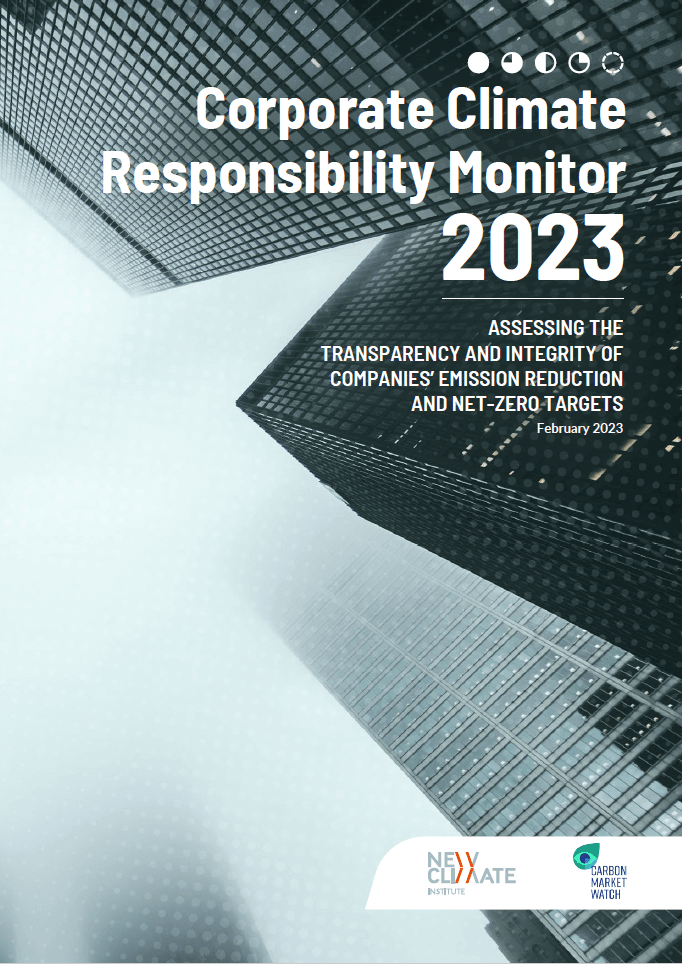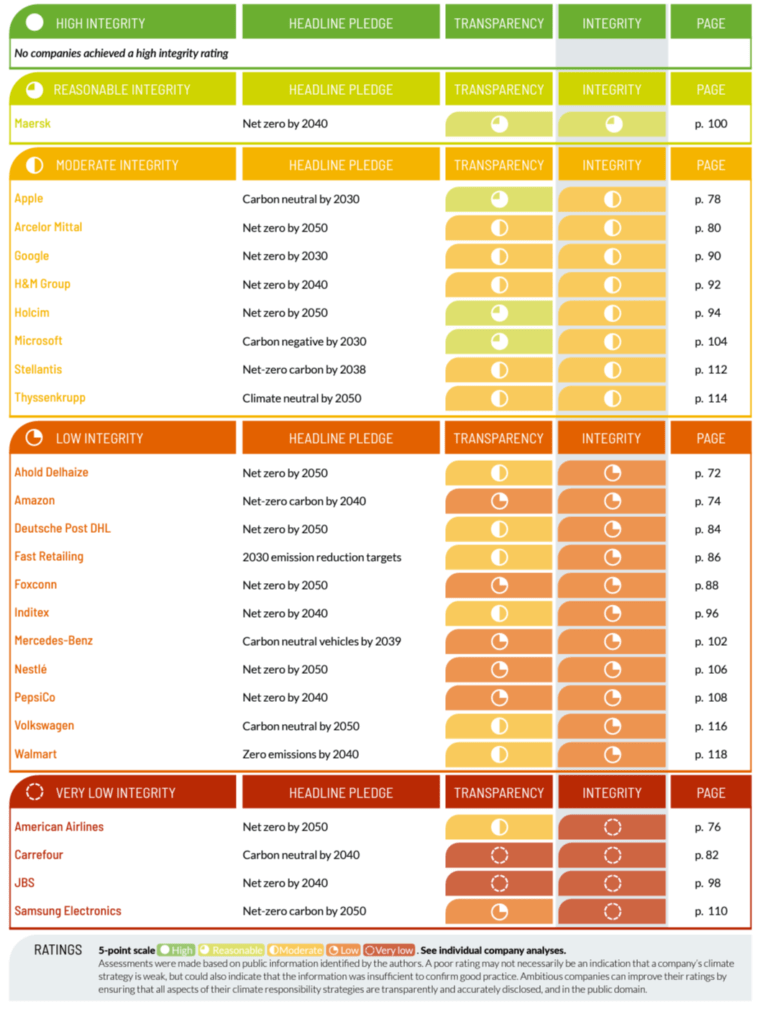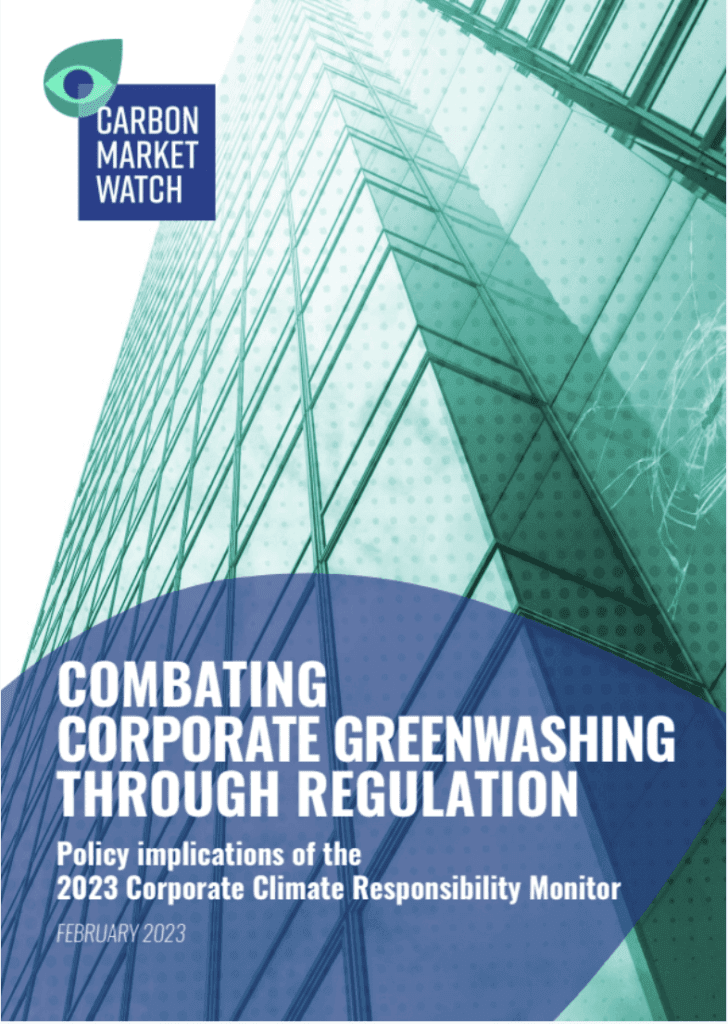Despite claiming to be champions of climate action, two dozen of the world’s largest and richest corporations are hiding their climate inaction behind the fig leaf of green-sounding ‘net zero’ plans, concludes the 2023 edition of the Corporate Climate Responsibility Monitor. For that reason, governments must stop their dithering and regulate robustly what green claims companies are permitted to make.

The 24 major corporations assessed in this year’s Corporate Climate Responsibility Monitor (CCRM) – a joint initiative from the NewClimate Institute and Carbon Market Watch – are not only among the largest in the world but also claim to be climate leaders through their association with the UN-backed Race to Zero campaign. With a combined revenue of over €3 trillion and responsible for some 4% of global emissions, the featured companies are drawn from a wide variety of countries and fall into seven main sectors: automobiles, retail fashion, supermarkets, food and agriculture, tech and electronics, shipping and aviation, as well as steel and cement.
Despite their net zero pledges and claims of climate leadership, the overwhelming majority of these corporations are simply not delivering the goods they promised. In fact, the main shortcomings of companies’ climate targets and plans are largely similar to those identified in last year’s edition of the CCRM.

“At a time when corporations need to come clean about their climate impact and shrink their carbon footprint, many are exploiting vague and misleading ‘net zero’ pledges to greenwash their brand while continuing with business as usual,” says Carbon Market Watch’s Executive Director Sabine Frank. “This dangerous procrastination must stop. Since multinationals have both an oversized impact on the planet and the means to reduce their carbon footprint, they must take real action to clean up their act and not just their image by slashing their emissions.”

“In this critical decade for climate action, companies’ current plans do not reflect the necessary urgency for emission reductions,” says Thomas Day, co-author of the report. “Regulators, voluntary initiatives and companies must place a renewed and urgent focus on the integrity of companies’ emission reduction plans up to 2030. The discourse on longer-term net zero should not distract from the immediate task at hand.”
How low can you go?
Not a single of the 24 corporations’ climate plans received a ‘high integrity’ score in this year’s CCRM (see table). And, like last year, only one company, Danish shipping giant Maersk, got a ‘reasonable integrity’ ranking. Apple, ArcelorMittal, Google, H&M Group, Holcim, Microsoft, Stellantis and Thyssenkrupp all managed to bag a ‘moderate integrity’ score, while the remaining 15 corporations ranged between low and very low.
While net-zero pledges give the superficial impression that emissions will plummet to nil or close to nil, deep digging throws up a very different reality. In the vital medium term, when the world needs to almost halve its carbon footprint if we are to keep temperature rises within the relatively safe 1.5°C, the 22 assessed corporations that have a 2030 target commit to delivering a median reduction of a paltry 15% in their real emissions by 2030.
The outlook is similarly bleak for the longer term. By 2050, it is widely accepted that corporations will need to have reduced their emissions by 90-95% compared with current levels. However, the CCRM calculates that, taken together, the net zero pledges of the 24 corporations amount to a measly 36% by mid-century.
Offsetting ambition

Misleadingly, half of the evaluated companies – including Apple, DHL, Google and Microsoft – are already making carbon neutrality claims, but these claims only cover 3% of those companies’ emissions. More worryingly still, three-quarters of the corporations plan to offset or neutralise a significant portion of their emissions using carbon credits from forestry and other land use projects.

“Not only do these solutions only store carbon temporarily and are vulnerable to reversals, we would need a second planet Earth to absorb global emissions if everyone decided to offset like these corporations,” says CMW’s Policy Director Sam Van den plas.
Another problematic issue is the emerging trend towards so-called “insetting”, which is a vague concept similar to offsetting, though with few checks and balances, that occurs within the company’s own value chain.
Despite the lacklustre overall performance of the featured corporations, some have shown leadership in some areas of climate action. H&M, Maersk and Stellantis, for example, have put in place potentially credible commitments to deep decarbonisation in the longer term. Google is pioneering technology that monitors and matches renewable energy consumption and production round the clock, while DHL is investing in electrifying its fleet and producing low-carbon fuel.
However, these advances are too few and far between to deliver the kind of step change that is urgently required.
No more greenwashing
Corporate greenwashing of this sort has massive implications for the climate and for society.

“Spurious ‘net zero’ and ‘carbon neutrality’ claims are incredibly damaging,” explains CMW’s Lead on Global Carbon Markets Gilles Dufrasne. “They give the illusion that corporations are taking serious action to tackle the climate crisis when, in reality, they are sweeping the problem under the carpet and leaving it to others and future generations to clean up their mess.”

For that reason and based on the findings of the Corporate Climate Responsibility Monitor, Carbon Market Watch has come up with a set of recommendations for governments and corporations. Foremost among these is that governments must ban the use of misleading terms, such as carbon neutrality and unsubstantiated net zero claims, from companies’ communications. For their part, corporations should voluntarily desist from making these disingenuous claims to avoid the growing reputational damage involved and to reduce the risk of litigation that accompanies such misleading advertising.

“By making such outlandish carbon neutrality claims, these corporations are not only misleading consumers and investors, they are opening themselves up to increasing legal and reputational liability. Governments must act now to make it impossible for companies to make these false and damaging claims,” says Lindsay Otis, a policy expert on global carbon markets at Carbon Market Watch. “For their part, corporations must stop claiming that they can unequivocally cancel out their harmful climate impact simply by purchasing carbon credits instead of reducing their own emissions. When purchasing carbon credits, these corporations need to accurately communicate to consumers what this action truly amounts to: a contribution, or a donation, to a mitigation project and not a neutralisation of emissions.”
The European Union has a golden opportunity to restrict this form of corporate greenwashing and set an example for other governments to emulate. The EU institution are in the midst of updating EU consumer protection legislation to better protect consumers against these pervasive greenwashing practices (see: Empowering Consumers for the Green Transition). However, the proposals on the table do not go far enough to put an end to these deceptive claims. Thus, EU policymakers must instate a complete prohibition on all claims of climate or environment-related neutrality or related variations, such as “carbon neutral”, “CO2 neutral”, “CO2 compensated”, “climate positive”, “net zero”, etc.
For that reason, Carbon Market Watch and other NGOs (including Client Earth, ECOS and the EEB) will also send out, on 13 February, an open letter to the EU institutions urging them to put in place such an airtight ban in order to protect consumers and to “enable them to understand and embrace their role in Europe’s green transition”.






